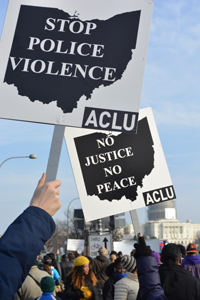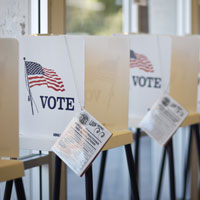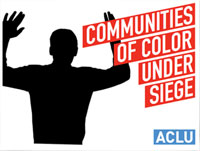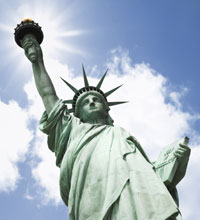News & Commentary
Police Body Cameras Are Promising, but Need Protections in Place
Photo: West Midlands Police via Flickr Creative Commons
By Gary Daniels

Why Cops Can’t Get Respect
Michael Uth is a member of the ACLU of Ohio Board of Directors.
This post was first published on the Ohio Daily Blog.
By Mike Uth

Seeking the Right Questions On Race and Criminal Justice Reform
Photograph courtesy of Rachel Woods You will never find a solution without asking the right questions. Last week, Columbus hosted two different gatherings intended to address tensions between communities of color and law enforcement. While part of the same conversation, both brought different people and different approaches to find solutions. At the end of the day, they raised important questions around race and criminal justice reform. Wednesday: A National Initiative On Wednesday, the first meeting of the National Initiative on Building Community Trust and Justice convened at Capital Law School. Funded by a U.S. Department of Justice grant, this program attempts to develop concrete proposals for fostering racial reconciliation, recognizing implicit bias, and advancing procedural justice. Representatives from the DOJ, criminal justice researchers, and policy experts are traveling the country to engage in dialogue with community members. The purpose and goals of the initiative offered an encouraging sign that the outrage felt across the nation has been heard at the highest levels of government. Demands from the streets, churches, and community centers across the country have secured a place on the federal agenda. The speakers expressed their optimism about the program and their desire to hear what local communities have to say. But as the third panel of experts took their places in the front of the room, it seemed that the time allotted for outside voices had been a secondary consideration. Thursday: People First On Thursday, charter buses lined up near the Ohio Statehouse as people from across Ohio came together for the People First Assembly. This event, coordinated by the Ohio Organizing Collaborative, brought together community members and local leaders to tell their stories about the criminal justice system to the offices of their state representatives.

An End to Highway Robbery? Not Quite Yet
Fourth Amendment, U.S. Constitution
It’s one of the most highly praised constitutional rights in the world. In reality, however, the Fourth Amendment has been severely diluted. A good example is related to seizure of assets—cash and property like vehicles and real estate—without warrants or criminal charges.
Inequitable Justice
Until a recent cha

Stay Informed
Sign up to be the first to hear about how to take action.
By completing this form, I agree to receive occasional emails per the terms of the ACLU’s privacy statement.
By completing this form, I agree to receive occasional emails per the terms of the ACLU’s privacy statement.




